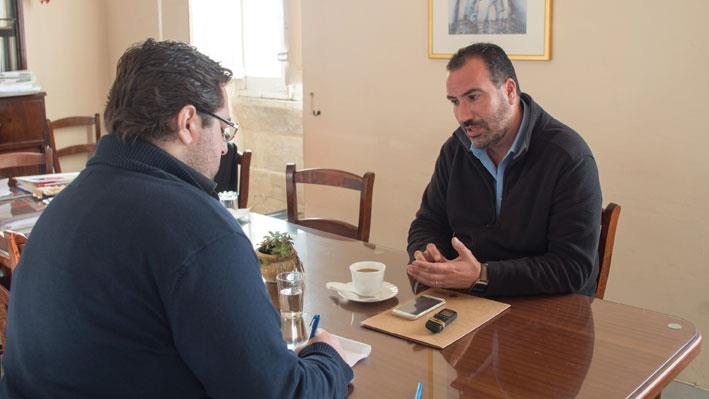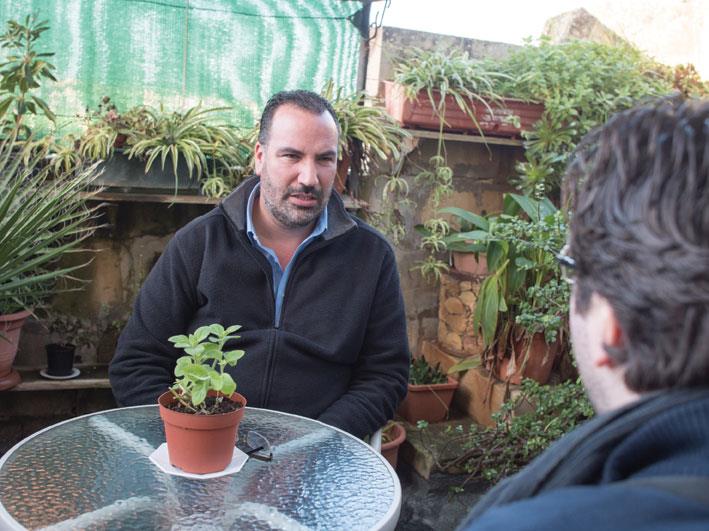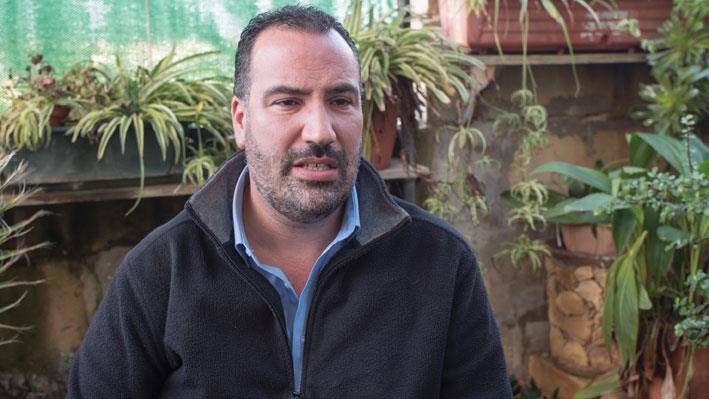Caritas will once again host its annual, now traditional, Christmas Day lunch for the lonely, thereby offering a place for those who would otherwise spend the day alone to have lunch, and meet other people.
Loneliness is perhaps most often overlooked, and affects people from all walks of life. This will be the fourth year Caritas will host such an event, and the first year it will be held under the leadership of the new Caritas director, Anthony Gatt.
Gatt is a former volunteer at Caritas and had worked there for a number of years. He previously worked in the drug rehabilitation field at Sedqa. He has been director for close to four months.
During an interview with The Malta Independent, Gatt explains the causes of loneliness in today’s society, and how the more vulnerable among us, the elderly and youths, are among those who struggle with this situation, as adults become ever more busy, and with the sense of community dwindling. “Mother Teresa said that if you want to change the world, love your family. You need to start with the small.” In this way, Gatt explains, tackling loneliness is an issue which all society should take up, and how the little things could make a big difference.
He also highlights how those who come to the lunch and indicate that they want further assistance will be aided by the volunteers, and if needed, directed to other services within or outside of Caritas.
This year’s event also coincided with Caritas’ 50th anniversary, of which one of the main themes is tackling loneliness, he explained.

What is the importance of this Christmas lunch event?
This is the fourth year Caritas will host this event, and happens to fall on Caritas’50th anniversary. During this 50th anniversary we have focussed on the issue of loneliness, and this event fits in perfectly with our campaign to help people become more sensitive to others around them.
People who feel alone feel that way year round; however Christmas is particularly difficult for many people who suffer from loneliness. If one feels alone or feels abandoned, seeing people spending time with family enjoying themselves... can be even more painful.
This is an opportunity for such people to come and experience a sense of community and family.
We recently held a meeting for volunteers, and we have around 80 this year. We are very thankful for the volunteers, who are ready to give their time on Christmas Day.
Three years ago I was already working with Caritas, and the original idea was to help people who are homeless and did not have enough financial means, however the scope expanded, when we realised that people were also coming because they were suffering from loneliness.

Does Caritas offer some form of after care?
We are interested in following up with those people who would like to be in contact with us. The volunteers are not only there to just welcome cook and serve, but also sit on the tables, conversing and facilitating conversation among the smaller groups. If someone expresses some need we will have our social workers and counsellors on the ground who the person can be referred to.
If someone joins the Christmas lunch, and are feeling very depressed and there is a cry for help in that encounter, that is an opportunity to engage and help them, and so we try to take up those opportunities and help.
If there is someone who is in a problematic financial situation, our social worker can, for example, refer the person to other services inside and outside of Caritas.
We as Caritas also offer support to Catholic parishes. Every parish has a committee that takes care of people in need in that locality, and we offer some support to those parishes. We also encourage parishes and communities to organise their own events to help those who feel lonely. If an elderly person who lives in a particular community where the parish has a social club, and comes to our Christmas meal, we can link that person to that network within their community.

Loneliness is not something Caritas can tackle alone. What needs to be done to tackle this issue?
I mentioned the direct services Caritas offers, and other NGOs also offer such services. Government also has a responsibility both in terms of service provision and in terms of policy, which can encourage or discourage social interaction. This is something we need to carry altogether as a society.
Small things can make a big difference. An elderly person recently told us that they were on a bus, nowhere to sit and nobody took the initiative to offer up their seat. This was a visibly elderly person struggling, and this is concerning as the sense of community is dwindling. Small things can help, and it can be as small as smiling at a person, or being mindful of the people around you, or parents spending more time with their children.
Parents can fall trap into handing out technological devices to their children so that they would use social media in order to keep them quiet for hours instead of interacting with them.
Mother Theresa said that if you want to change the world, love your family. You need to start with the small.
Where will the dinner be held?
The Caritas Christmas lunch will be held at the Archbishop’s Curia building in Floriana. Last year around 400 people attended, and this year the same amount, if not slightly more, are expected to attend.
This lunch will not be possible without Caritas Malta staff and volunteers together with the kind intervention of Archbishop Charles J Scicluna, President Marie-Louise Coleiro Preca, the Alfred Mizzi Foundation who devoutly prepare the lunch for all those attending and other benefactors.
You said that Christmas is a time of year when people would be more affected by loneliness. What situations are leading to people feeling lonely?
Since we began looking into it, and listening to peoples’ stories, we discovered that there are a number of factors.
Loneliness does affect affluent societies. In the UK, loneliness developed to a point where the government felt the need to have a minister responsible for such a portfolio. In Australia there is a high rate of suicide relating to people who feel estranged and alienated.
In Malta, we’ve seen development in the economy and there is certain affluence especially in some sections of society. Loneliness affects different sectors of society but the elderly can be hit quite hard if they are somewhat estranged from their children because they are working abroad, or if the children are too immersed in their work to care for them, or if there is a rift.
Also the fertility rate in society is reducing and couples are having less and less kinds and so there are fewer children there to take care of their parents.
There are elderly who feel invisible, where they do not have the opportunity to interact. There is a new reality where elderly homes employ foreign workers who don’t speak Maltese, and there are elderly people who do not speak English, and so they feel invisible. I was told by a person whose parents reside in an elderly home that, those elderly residents without a family are taken to their rooms at 5 pm, and they are brought out the next day for breakfast. Spending so much time, day in, day out, alone can be very tough. Then there are those with dementia who need to stimulate their minds but such situations do not help.
We also live in a consumerist society, where people chase material goods having to work more in order to do so. Adolescents need their parents, and while it is a stage where they want to branch out they still need their parents. Teens report that they do not have enough time with their parents and that their parents are too nervous, not having enough time and are under too much work pressure.
There was a recent study which found that the more time young people spent on social media the higher they ranked on the loneliness scale. This is not necessarily a cause and effect situation, but more of a correlation

What about communities?
People move away from their original home or village, moving away from their original community and so there is less contact, and a lower sense of community. If you live in an apartment block you could go weeks without seeing your neighbour when you don’t know anyone.
There have been situations where people have passed away in their homes taking weeks for anyone to realise.
Do you think village activities, like feats and others, could help prevent loneliness, and are they dying out?
Being a small country with traditions, I am not saying our sense of community is dead, but it is being threatened. When the sense of community is being threatened then there is a higher chance for people to experience loneliness.
Village feasts are as strong as ever, maybe less religious and more secularised. The partying part of it seems to have overtaken the religious part.
Also, there are issues with carer shortages. While there are many great carers in the caring profession, there are carers who are overworked, or have too many patients to take care of and more and more carers who view it more as a job than as a vocation. There are less people going into social work and we have a crisis in some of the caring professions as people are not choosing to go into caring, and I think that is also a significant indicator of where we are going as a society.